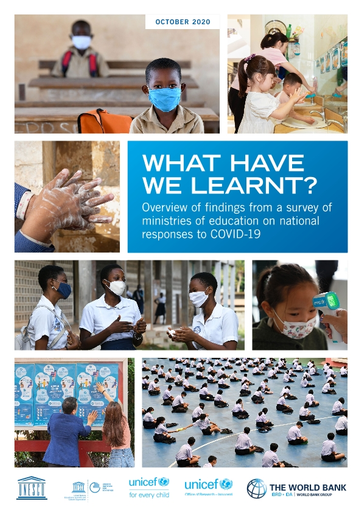
What Have We Learnt?
An Overview of Findings from Survey of Ministries of Education
on National Responses to COVID-19
As part of the coordinated global education response to COVID-19 pandemic, UNESCO, UNICEF and the World Bank have conducted a survey on National Education responses to COVID-19 School Closures. Results from the data collection are showcased, sharing lessons learnt from government responses to school closures from pre-primary to secondary education.
The webinar, which was also participated in by the LCC Secretariat was conducted on November 4, 2020 via different Zoom satellites, and was administered by UNESCO, UNICEF, and World Bank researchers situated in different countries such as Amsterdam, Berlin, Rome, Stockholm, and Vienna. Various participants from all around the globe including doctors, PhD students, and many others were enthusiastic to join and formulate solutions on the results of the survey presented.
This webinar was initiated with a brief snapshot of survey on national responses to school closure. From there on, the structure of survey was established, along with the main topics that focused on: 1) Plans for re-opening schools; 2) The plan for the school calendar; 3) Distance education delivery systems; 4) Online distance learning strategies; 5) Role of teachers; 6) Role of students; 7) Role of Parents/Caregiver; 8) Learning, assessment and examinations; and 9) Financing.
The first segment addressed the mitigating learning as different school openings from all over the world led to lost opportunities in learning. Some countries lost as much as one-third of a school year and led to a discrepancy between the schools in the Northern and Southern hemisphere.
The second segment of the survey stressed the key findings in deploying effective remote learning strategies which gave emphasis on countries using different learning platforms from different socio-economic class and concluded that remote learning has changed the landscape on how learning was made and expedited opportunities in some environments to different income countries.
Policies to support teachers were also given emphasis as survey showed that majority of the teachers were required to teach from school premises regardless of the countries’ economic standing. Additional support to teachers varies across income groups, but most were provided with instructions to operate the distance learning platforms and need more support amidst the pandemic. Equipping them with ICT knowledge, as well as other things which would enable them to stay effective and efficient were top priorities.
Parental support and engagement were also considered as 9 out of 10 countries reported that teachers and parents were to keep in regular interaction through text messaging and other forms of communication as a liaison of social interaction.
The last segment underscored the safe reopening of schools, health protocols and budget financing. The progress towards school reopening survey showed that as of September 2020, 3 out of 4 countries had fully or partially reopened schools and still increasing by 5 percent. Approaches and measures in school reopening. as well as health protocols for the safe reopening of schools were also discussed. The rest of the data showed that nearly 100% of responding countries have produced or endorsed specific health and hygiene guidelines and measures for schools. The survey also presented the source of funding to support safety measures from government allocations.
Education financing for COVID-19 response showed that in almost all countries, (95%) additional funds have been provided to cover COVID-19 related costs. The last part of the segment portrayed the needs of every country depending on their economic standing.
Prior to the pandemic, UNESCO, UNICEF, and the World Bank already conducted several joint researches on education. The global trends presented were clear and concise, yet additional demands of research are still needed to cater the needs of the growing trend as the challenge of the pandemic is still present and continuation of research surveys on monitoring the school openings and opportunities would help strengthen the approach of global perspective.
Terence Joshua S. Canlas
Source: https://events.unesco.org/event?id=919915775&lang=1033
LCC participates in joint UNESCO-UNICEF-World Bank webinar series on the reopening of schools – LCC Deped
bztbcjfvr http://www.g0a4z18u5bd236b36t32bx5x8ccg5y1ys.org/
abztbcjfvr
[url=http://www.g0a4z18u5bd236b36t32bx5x8ccg5y1ys.org/]ubztbcjfvr[/url]